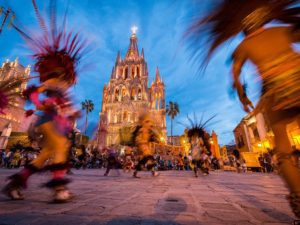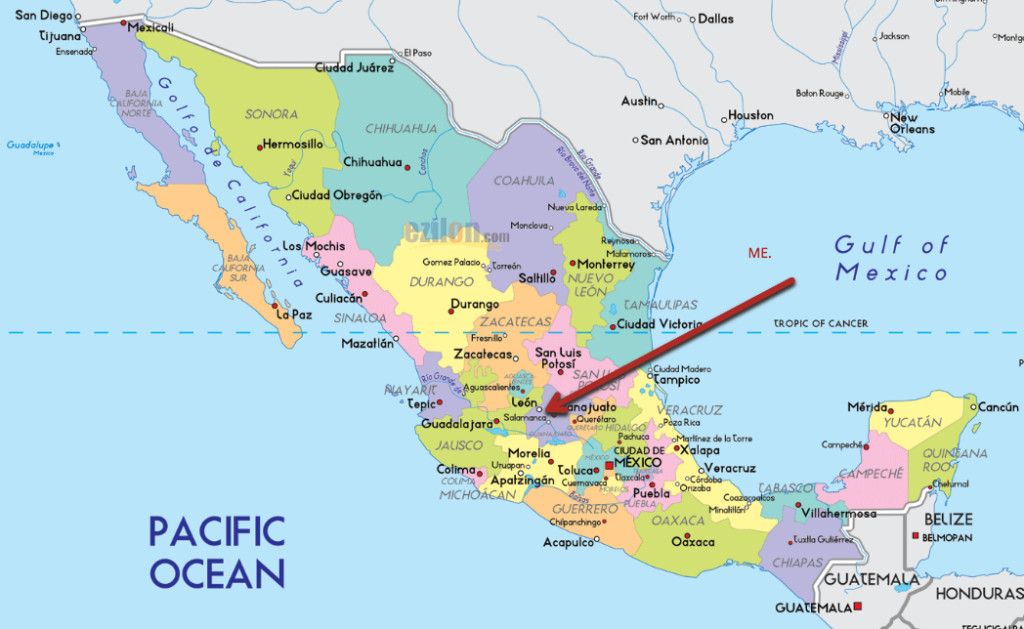Are you an American LGBTQ+ individual dreaming of a vibrant life in Mexico? Moving to Mexico can be an exciting adventure, and at gaymexico.net, we provide comprehensive guidance on LGBTQ+ life, safe travel destinations, and resources to help you make a smooth transition. Discover how you can make Mexico your new home, with insights on residency, cultural nuances, and community connections. Looking for LGBTQ+ friendly locations and expat resources in Mexico?
1. Why Should LGBTQ+ Americans Consider Moving To Mexico?
Mexico offers a unique blend of cultural richness, affordability, and a welcoming atmosphere that can be particularly appealing to LGBTQ+ individuals. Here are several compelling reasons to consider making the move:
- Cultural Diversity and Beauty: Mexico boasts diverse landscapes, from stunning beaches to majestic mountains, vibrant cities, and ancient pyramids.
- Affordable Living: The cost of living in Mexico is significantly lower than in many U.S. cities, often around 50% less than cities like Chicago.
- Permanent Residency Options: Unlike many countries, Mexico offers pathways to permanent residency.
- Convenient Time Zone: Mexico shares time zones with the U.S., making it easy to stay connected.
- Easy Travel to the U.S.: Frequent and affordable flights make traveling back to the U.S. simple.
- Pleasant Climate: Many regions, especially areas like San Miguel de Allende, offer ideal climates.
- Remote Work Opportunities: Mexico provides reliable internet connectivity for remote workers.
- Warm and Welcoming Culture: Mexicans are known for their hospitality and rich cultural traditions.
- Progressive Social Values: Mexico has shown a willingness to embrace progressive values, including electing a woman president.
2. Is Mexico Safe For LGBTQ+ Expats?
While safety is a valid concern, Mexico is generally safe for LGBTQ+ expats, particularly in tourist and expat-friendly areas. It’s essential to stay informed and take precautions, but here’s some perspective:
- Low Risk for Tourists: Newsweek reported that out of over 25 million American visitors to Mexico in 2022, only a small fraction were victims of violent crime.
- Cartel Violence: While cartel-related violence is a serious issue, it primarily affects those involved in the drug trade. Cartels typically avoid targeting foreigners, as it’s bad for business.
- Specific State Concerns: Some Mexican states have higher crime rates. Researching specific areas is crucial.
- Personal Responsibility: As in any country, it’s vital to avoid risky situations and be aware of your surroundings.
3. What Are The Initial Steps To Moving To Mexico As An American?
Moving to Mexico involves several key steps to ensure a smooth transition. Here’s a breakdown of the initial actions you should take:
- Research and Planning:
- Define Your Goals: Determine why you want to move to Mexico. Are you seeking a lower cost of living, a change of scenery, or access to specific cultural experiences?
- Choose a Location: Research different cities and regions in Mexico to find the best fit for your lifestyle and preferences. Consider factors like climate, cost of living, and proximity to amenities.
- Visit Mexico: Spend time in your target area to experience it firsthand. This will help you decide if it’s the right place for you.
- Financial Preparation:
- Assess Your Finances: Evaluate your income, savings, and any potential sources of revenue in Mexico.
- Open a Mexican Bank Account: Having a local bank account will simplify financial transactions.
- Budget: Create a detailed budget that includes housing, healthcare, food, transportation, and other expenses.
- Legal and Administrative Steps:
- Obtain a Visa: Determine the appropriate visa based on your intended length of stay and activities in Mexico.
- Gather Required Documents: Collect all necessary documents, such as your passport, birth certificate, and financial statements.
- Apply for Residency: If you plan to stay long-term, apply for either a temporary or permanent residency visa.
- Practical Preparations:
- Learn Spanish: While English is spoken in tourist areas, learning Spanish will greatly enhance your experience.
- Find Housing: Research housing options and secure a place to live, whether renting or buying.
- Arrange Transportation: Decide whether to bring your car or purchase one in Mexico.
- Set Up Utilities: Arrange for essential services like electricity, water, and internet.
- Healthcare and Insurance:
- Obtain Health Insurance: Secure health insurance that covers you in Mexico.
- Find a Doctor: Locate a local doctor or healthcare provider.
- Understand the Healthcare System: Familiarize yourself with the Mexican healthcare system, including public and private options.
- Cultural Immersion:
- Learn About Local Customs: Understand and respect Mexican customs and traditions.
- Join Expat Communities: Connect with other expats for support and advice.
- Engage with Locals: Build relationships with Mexican residents and participate in community events.
 Colorful buildings in San Miguel de Allende, Mexico, showcasing colonial architecture and vibrant culture.
Colorful buildings in San Miguel de Allende, Mexico, showcasing colonial architecture and vibrant culture.
4. Which Cities In Mexico Are Most Welcoming To The LGBTQ+ Community?
Mexico has several cities known for their LGBTQ+ friendliness, offering vibrant communities and welcoming environments. Here are some of the top choices:
- Puerto Vallarta: Often called the “San Francisco of Mexico,” Puerto Vallarta is renowned for its thriving LGBTQ+ scene, featuring numerous gay bars, clubs, and beaches.
- Mexico City: As the capital, Mexico City boasts a large and diverse LGBTQ+ community with a wide array of cultural events, nightlife, and LGBTQ+ organizations.
- Guadalajara: Known for its rich cultural heritage and friendly atmosphere, Guadalajara has a growing LGBTQ+ scene, particularly in the Chapultepec district.
- San Miguel de Allende: This charming colonial town is popular among expats and offers a relaxed and inclusive environment with a burgeoning LGBTQ+ community.
- Tulum: With its beautiful beaches and bohemian vibe, Tulum is increasingly attracting LGBTQ+ travelers and residents.
- Playa del Carmen: This coastal city in the Riviera Maya has a welcoming atmosphere and a growing number of LGBTQ+ friendly establishments.
- Oaxaca: Known for its vibrant arts scene and indigenous culture, Oaxaca offers a unique and accepting environment for LGBTQ+ individuals.
5. What Are The Visa Requirements For Americans Moving To Mexico?
Understanding the visa requirements is crucial for Americans planning to move to Mexico. The Mexican government offers several types of visas, each designed for different lengths of stay and purposes:
- Tourist Visa (FMM):
- Purpose: For stays of up to 180 days for tourism, business, or short-term studies.
- Requirements: Valid U.S. passport and completion of the FMM form (Forma Migratoria Múltiple), which is often provided by the airline or at the point of entry.
- Process: Obtain the FMM form and ensure it is stamped upon arrival in Mexico.
- Temporary Resident Visa:
- Purpose: For individuals planning to live in Mexico for more than six months and up to four years. This visa is suitable for retirees, students, and those working remotely.
- Requirements:
- Proof of sufficient monthly income (e.g., pension, investments) or substantial savings.
- Application form and supporting documents (passport, birth certificate, marriage certificate, etc.).
- A visa interview at a Mexican consulate in the U.S.
- Process:
- Apply online and schedule an appointment at a Mexican consulate in the U.S.
- Attend the interview and submit all required documents.
- If approved, obtain the temporary resident visa.
- Within 30 days of arriving in Mexico, register with the National Immigration Institute (INM) to obtain your resident card.
- Permanent Resident Visa:
- Purpose: For individuals seeking to live in Mexico indefinitely.
- Requirements:
- Must have held a temporary resident visa for at least four years.
- Meet income or asset requirements, demonstrating financial stability.
- Application form and supporting documents.
- Process:
- Apply for permanent residency at an INM office in Mexico.
- Provide evidence of meeting the eligibility criteria.
- Attend any required interviews.
- If approved, obtain your permanent resident card.
It is essential to check the most current regulations with the Mexican consulate or embassy, as visa rules can change.
6. How Can LGBTQ+ Individuals Find Housing In Mexico?
Finding a safe and welcoming home is a top priority for LGBTQ+ individuals moving to Mexico. Here’s how to navigate the housing market:
- Online Resources: Use websites like Airbnb, VRBO, and local real estate portals to find apartments and houses in LGBTQ+-friendly neighborhoods.
- Local Real Estate Agents: Work with real estate agents who understand the needs of LGBTQ+ clients and can help you find suitable properties.
- Expat Communities: Connect with expat communities online and in person to get recommendations for LGBTQ+-friendly landlords and neighborhoods.
- LGBTQ+ Groups: Join LGBTQ+ groups and forums in Mexico to ask for advice and recommendations from locals and other expats.
- Visit in Person: Spend time in different neighborhoods to get a feel for the atmosphere and determine if it’s a good fit for you.
- Consider Short-Term Rentals: Start with a short-term rental to explore different areas before committing to a long-term lease or purchase.
7. How Does The Cost Of Living In Mexico Compare To The U.S.?
One of the primary attractions of moving to Mexico is the lower cost of living compared to the United States. Here’s a detailed comparison:
| Expense | United States | Mexico | Notes |
|---|---|---|---|
| Housing (Rent) | $1,500 – $3,000/month | $500 – $1,500/month | Varies greatly by location; larger cities and tourist areas are more expensive. |
| Groceries | $400 – $800/month | $200 – $400/month | Fresh produce and local products are generally cheaper. |
| Healthcare | $500 – $1,500/month | $100 – $500/month | Public healthcare is available, but many expats opt for private insurance or out-of-pocket payments. |
| Transportation | $200 – $500/month | $100 – $300/month | Public transportation is affordable; owning a car can be expensive due to import fees and maintenance. |
| Utilities | $150 – $300/month | $50 – $150/month | Electricity can be more expensive in some areas; water and gas are generally cheaper. |
| Entertainment | $200 – $500/month | $100 – $300/month | Eating out and entertainment are generally cheaper, especially at local establishments. |
| Total (Approx) | $2,950 – $6,600/month | $1,050 – $3,150/month | Overall, the cost of living in Mexico can be 50% or less than in the U.S., depending on lifestyle and location. |
8. What Healthcare Options Are Available For Expats In Mexico?
Access to quality healthcare is a crucial consideration for expats in Mexico. Here’s an overview of the available options:
- Public Healthcare (IMSS):
- Description: The Instituto Mexicano del Seguro Social (IMSS) is Mexico’s public healthcare system, available to legal residents.
- Eligibility: Open to those with a residency visa and a registered address.
- Cost: Affordable monthly fees based on income.
- Coverage: Comprehensive medical services, including doctor visits, hospital care, and prescriptions.
- Private Healthcare:
- Description: Mexico has a robust private healthcare sector with modern facilities and English-speaking doctors.
- Cost: More expensive than public healthcare but generally cheaper than in the U.S.
- Coverage: Access to specialists, shorter wait times, and higher standards of care.
- International Health Insurance:
- Description: Many expats opt for international health insurance plans that provide coverage in Mexico and other countries.
- Benefits: Flexibility to choose providers and facilities, comprehensive coverage, and emergency evacuation services.
- Out-of-Pocket Payments:
- Description: Many expats choose to pay for healthcare services out of pocket, particularly for routine visits and minor procedures.
- Cost: Doctor visits can range from $20 to $50, and dental procedures are significantly cheaper than in the U.S.
9. How Can LGBTQ+ Expats Build A Community In Mexico?
Building a supportive community is essential for a successful transition to life in Mexico. Here are some ways LGBTQ+ expats can connect with others:
- Online Forums and Social Media: Join Facebook groups, Reddit forums, and other online communities for LGBTQ+ expats in Mexico.
- LGBTQ+ Organizations: Connect with local LGBTQ+ organizations and community centers to participate in events and activities.
- Expat Meetups: Attend expat meetups and social events to meet other expats from around the world.
- Language Exchange Programs: Participate in language exchange programs to improve your Spanish and connect with locals.
- Volunteer: Volunteer for local charities and organizations to meet people and give back to the community.
- Cultural Events: Attend cultural events, festivals, and concerts to immerse yourself in Mexican culture and meet new people.
- Sports and Recreation: Join sports teams, hiking groups, or other recreational activities to meet like-minded individuals.
10. What Are The Legal Considerations For LGBTQ+ Individuals In Mexico?
Understanding the legal landscape is essential for LGBTQ+ individuals moving to Mexico. Here are some key points:
- Same-Sex Marriage: Legal throughout Mexico since 2015, with all states required to recognize and perform same-sex marriages.
- Adoption: LGBTQ+ couples have the right to adopt children in many states, with laws varying by region.
- Discrimination Protection: While there is no federal law protecting against discrimination based on sexual orientation or gender identity, some states and cities have implemented anti-discrimination laws.
- Gender Identity: Mexico has made progress in recognizing transgender rights, with some states allowing individuals to change their legal gender on official documents.
- Healthcare Access: LGBTQ+ individuals have the right to access healthcare services without discrimination.
- Legal Assistance: Several organizations provide legal assistance and advocacy for LGBTQ+ rights in Mexico.
 Map of Mexico highlighting San Miguel de Allende, showcasing its central location.
Map of Mexico highlighting San Miguel de Allende, showcasing its central location.
FAQ Section
1. Can an American citizen easily move to Mexico?
Yes, it is relatively straightforward for American citizens to move to Mexico, especially compared to many other countries. Mexico offers several visa options, including tourist visas for short stays and temporary or permanent resident visas for longer stays, making it accessible for various purposes like retirement, remote work, or study.
2. What are the most LGBTQ+-friendly cities in Mexico for expats?
Puerto Vallarta, Mexico City, Guadalajara, and San Miguel de Allende are known for their welcoming and vibrant LGBTQ+ communities.
3. How long can an American stay in Mexico without a visa?
Americans can stay in Mexico for up to 180 days with a tourist visa (FMM), suitable for tourism, business, or short-term studies.
4. What financial documents do I need to show to get a residency visa in Mexico?
To obtain a residency visa, you typically need to show proof of sufficient monthly income (such as from a pension or investments) or substantial savings. Specific amounts vary, so check with the Mexican consulate.
5. Is healthcare affordable in Mexico for expats?
Yes, healthcare in Mexico is generally more affordable than in the U.S. Public healthcare is available, but many expats opt for private insurance or out-of-pocket payments, which are still relatively inexpensive.
6. Can LGBTQ+ couples legally marry in Mexico?
Yes, same-sex marriage is legal throughout Mexico since 2015.
7. Are there LGBTQ+ organizations in Mexico that can provide support?
Yes, several LGBTQ+ organizations in Mexico offer support, resources, and community connections.
8. How can I find LGBTQ+-friendly housing in Mexico?
Use online resources, connect with local real estate agents who understand LGBTQ+ needs, and join expat communities for recommendations.
9. Is it safe for LGBTQ+ individuals to travel and live in Mexico?
While safety is a consideration, many areas in Mexico are generally safe for LGBTQ+ individuals, especially in tourist and expat-friendly cities.
10. What are the main cultural differences Americans should be aware of when moving to Mexico?
Americans should be aware of differences in social customs, language, and the pace of life. Learning Spanish and understanding local customs can greatly enhance the experience.
Moving to Mexico as an LGBTQ+ American can be an enriching experience. By understanding the necessary steps, legal considerations, and cultural nuances, you can create a fulfilling and vibrant life in your new home. Visit gaymexico.net for more in-depth guides, resources, and community connections to help you on your journey. For personalized assistance, contact us at Address: 3255 Wilshire Blvd, Los Angeles, CA 90010, United States. Phone: +1 (213) 380-2177. Website: gaymexico.net.
